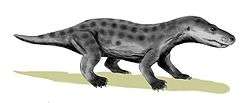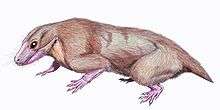Ericiolacerta
Ericiolacerta is an extinct genus of small therocephalian therapsids from the early Triassic of South Africa and Antarctica. It was around 20 centimetres (7.9 in) in length, with long limbs and relatively small teeth. It probably ate insects and other small invertebrates.
| Ericiolacerta | |
|---|---|
 | |
| Ericiolacerta parva | |
| Scientific classification | |
| Kingdom: | |
| Phylum: | |
| Subphylum: | |
| Class: | |
| Order: | |
| Suborder: | |
| Family: | |
| Genus: | Ericiolacerta |
| Species | |
| |

The therocephalians – reptiles with mammal-like heads – were quite abundant in Permian times, but only a few made it into the Triassic. Ericiolacerta was one of those. It is possible that they gave rise to the cynodonts, the only mammal-like reptile group to exist into late Triassic times. It was these that gave rise to the mammals.
Little holes in the snout area of the skull suggest that perhaps the snout had highly developed sense organs, like whiskers. There is a palate in the roof of the mouth, separating the breathing passage from the eating area. This suggests an efficient eating mechanism that may indicate a warm-blooded lifestyle.
Ericiolacerta, meaning "Eric's little lizard", was named in 1931.
See also
References